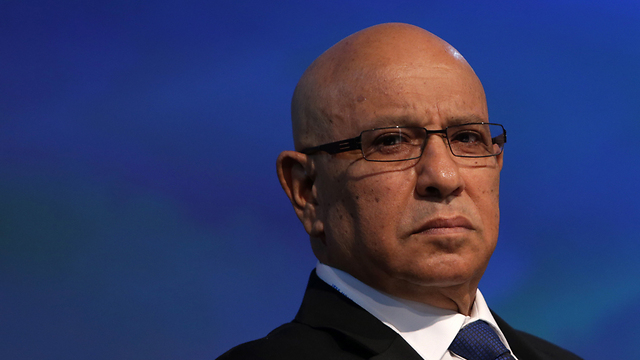Ex-Mossad chief Meir Dagan dies
Director of the Mossad from 2002-2011 passes away at 71 after battle with cancer; Dagan filled a number of senior defense roles and fought in the Six Day, Yom Kippur, and First Lebanon Wars.
“The Institute for Intelligence and Special Operations (Mossad) announces that former Mossad Director Meir Dagan passed away this morning,” said an official Mossad statement. “Mossad Director Yossi Cohen, department chiefs, and Mossad staff express deep sorrow and send condolences to the Dagan family.”
Dagan was born in January, 1945 in what is now Ukraine. He and his family moved to Israel when he was five. The family lived in the Mahane Israel transit camp near Lod. In 1963, Dagan began his army service as a paratrooper. During the Six Day War, he commanded a company in battles in the Sinai. In 1970, under GOC Southern Command Ariel Sharon, Dagan formed Sayeret Rimon. This was a unit comprised of soldiers disguised as Arab locals that worked in the Gaza Strip to locate terrorists. The unit was credited with significantly helping t dampen terrorist activities in Gaza in the early 1970s.
Dagan was at the School of Staff and Command at the outbreak of the Yom Kippur War. Afterwards, he obtained the command of a patrol unit and fought in the Sinai, even crossing the Suez Canal.
In the First Lebanon War, he commanded the Barak tank division, and was one of the first division commanders to enter Beirut. Afterwards, he became head of the liaison unit in Lebanon.
He is thought of as one of the founders of the South Lebanese Army (SLA), which he used on different fronts, and which was used as the local Lebanese partner for the Shin Bet.
In 1991, Dagan became the IDF Chief of Staff advisor on the first intifada, and afterwards served as Head of the Operations Division in the General Directorate of the IDF at the rank of Lieutenant General. While there, he was under the direct command of Ehud Barak.
Later, he became a general and acted as the advisor of the Head of the Operations Directorate.
He left the IDF in 1995 after 32 years of service, throughout which he was injured twice, and even received the Medal of Courage after running at a Palestinian who was holding a grenade with the pin already pulled.
After leaving the IDF, Dagan became the counter terror advisor under Prime Ministers Yitzhak Rabin and Benjamin Netanyahu. In 2000 he joined the public campaign against the withdrawal from the Golan Heights.
In 2001, after Ariel Sharon won Israeli elections, Dagan became the chief security negotiator with the Palestinians.
A year later, Dagan was appointed to head of the Mossad by Sharon. His term was extended twice, once by Ehud Olmert, and once by Benjamin Netanyahu. He finally ended his term in 2011.
In Egypt he was referred to as "Superman," and other Arab countries have alleged that he was behind the assassinations of various Hamas and Hezbollah leaders.
Dagan came out against the prospect of a military strike on Iran several times after ending his tenure in 2011. “Bombing could speed up attainment of the bomb,” he said last May. “A bombing has no power to stop the project. If we bomb, we’ll encounter a reality in which we solve all Iran’s political problems and some of its economic ones by making the entire Iranian population rally behind the regime as one. “
“The fact that I ended my role is still doesn’t mean that my level of responsibility or desire to see Israel blossom has ended,” he said a month later. “Remember that my loyalty is first and foremost to the state and not the prime minister.”
In 2015, just a few days before elections for the 20th Knesset, Dagan gave a speech at a Rabin Square rally. With tears in his eyes, Dagan said: “I worry about our leadership” and urged a change to a leadership that would “serve the public and not itself.”
Dagan discovered he had advanced stages of liver cancer in 2012. He began an aggressive chemotherapy campaign, but the cancer continued to spread, and he began to suffer from liver failure.
He didn't fulfill the criteria for a liver transplant in Israel, as he was already by that time over the age Israeli cutoff age of of 65. He went around the world looking for a country to do the transplant, eventually settling on Belarus.
He secretly flew to Belarus in 2012, where the liver transplant was a success, but he was admitted to the isolation unit for fear of infection. His condition stabilized, and he returned to Israel.
"Through the efforts of many people, I was able to get this liver transplant which ended up saving my life," Dagan said.
Yet, despite the transplant, the cancer was still in his body.











